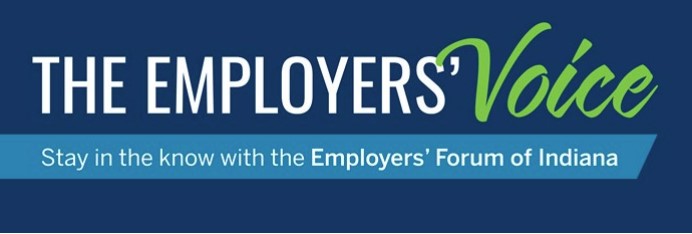
Welcome from the CEO
Welcome to this month’s issue of The Employers’ Voice, an e-newsletter for Employers’ Forum of Indiana members and participants.
In this issue we’ll share a snapshot of what the Forum has been up to; highlight local and national efforts around high quality, affordable healthcare; and introduce a sponsorship opportunity for our May conference at which the results of the RAND 3.0 study will be presented. We invite you to send resources and news of interest as the purpose of this newsletter is to provide a venue for sharing information among our diverse health care community.
I look forward to seeing you all at the November 20 All-Stakeholder Meeting!
Gloria Sachdev
President and CEO, Employers’ Forum of Indiana
Congratulations to All Forum Members
The Employers’ Forum of Indiana has been selected to receive the 2019 National Alliance Member Leadership Award!

The Forum is honored to
receive this award in November in Washington DC on behalf of all Forum members who were instrumental in bringing hospital price transparency to the forefront. This award is presented to the business coalition who demonstrated leadership and commitment to heath and healthcare value through and on behalf of their members and their employees, their community, and the National Alliance. The National Alliance noted that the Forum’s work on Rand 2.0 and continued contributions with Rand 3.0 has made a substantive and critical contribution both to the National Alliance and purchaser coalitions across the country.
Forum Snapshot
Lauren Vela: Reducing Wasteful Spending in Employers’ Pharmacy Benefit Plans
Ms. Lauren Vela, Senior Director of Pacific Business Group on Health, shared at the September 25th Forum meeting that identifying and eliminating drugs that add waste to employers’ formularies could reach savings of up to $63 million annually.
Self-Insured Employers Are Using Price Transparency To Improve Contracting With Health Care Providers: The Indiana Experience
Steep increases in health care cost take away from financial resources that could be used for capital investments, employee wage increases, and other spending priorities such as retirement plans. The growth in premiums, which occurred despite increases in deductibles, has primarily been driven by the increases in price rather than by use. In fact, employees’ use of most health care services has been declining.
Public Health Committee Meeting Focuses On High Health Care Costs
A state legislative public health committee met for the first time to discuss the high cost of health care in the state. Gloria Sachdev was invited to testify. “The single biggest driver of high healthcare costs is price,” says Sachdev. “This is not a mystery.”
Congratulations to American Health Network (AHN)
Congratulations to AHN for being the Top CMS ACO Performer!
The results are in from CMS and American Health Network is the top Medicare Shared Savings Program (MSSP) performer in Indiana, with a savings rate of 4.06%.
CMS, defines an ACO as “an organization of health care practitioners that agrees to be accountable for the quality, cost, and overall care of Medicare beneficiaries who are enrolled in the traditional fee-for-service program who are assigned to it”. By looking at who provided most of the primary care, CMS assigns patients to an ACO if the patient saw a primary care physician who was in the ACO. Primary care physicians can only be in one ACO.
At the end of the year, CMS measures ACO quality as a percentage of quality metrics achieved. CMS also calculates the spend for the patients assigned to the ACO. If that spend is below the CMS calculated benchmark by more than the threshold savings (established by CMS) then CMS shares the savings with the ACO. The share of the savings is adjusted by the quality score.
For the most recent year, 2018, the results for Indiana ACOs are as below. To account for different size ACOs the results are sorted by the savings rate. While these results are impressive, they do not tell the whole story. Many of the poor performing ACOs have decided to drop out. In 2018, 13% of the existing ACOs left the program.

Information above provided by Dr. Ben Park, President of American Health Network.
Further reading: Spread of ACOs And Value-Based Payment Models In 2019: Gauging the Impact of Pathways to Success.
Insurers Covering DNA Test for Psychiatric Drugs
DNA Tests For Psychiatric Drugs Are Controversial But Some Insurers Are Covering Them

make a genetic test to help doctors choose psychiatric
medicines for patients. Evidence that the tests are
effective has been called “inconclusive.
UnitedHealthcare, the nation’s largest insurer, began covering the tests as of October 1. In addition to UnitedHealthcare’s coverage, Myriad Genetics’ test is covered by Medicare, a regional Blue Cross Blue Shield affiliate, and the insurance network for the grocery chain Kroger.
In the News
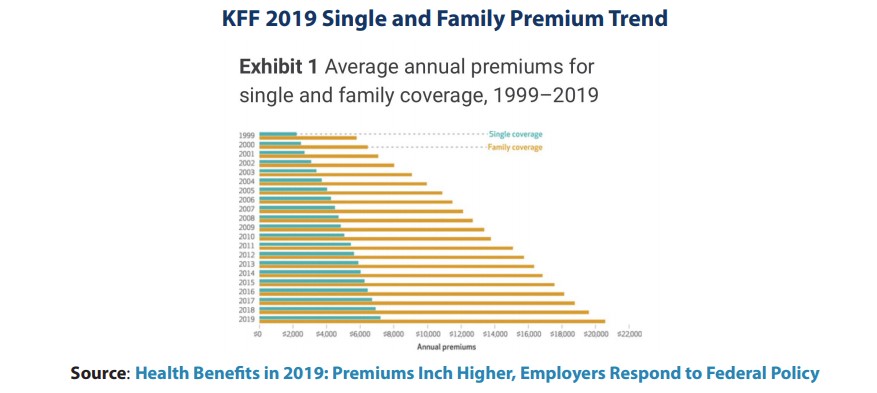
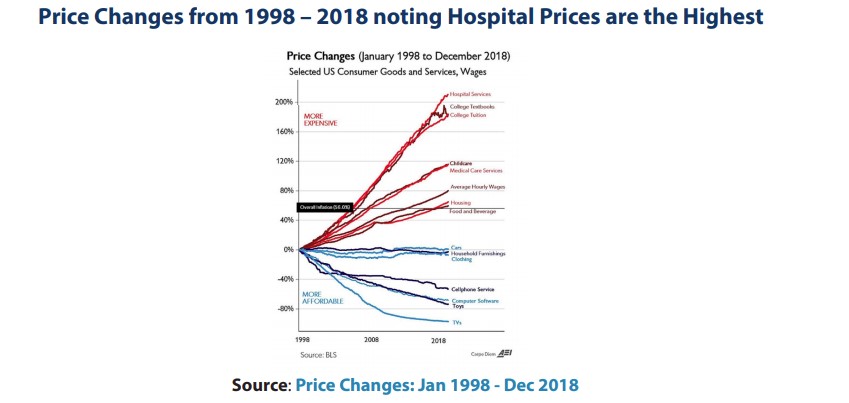
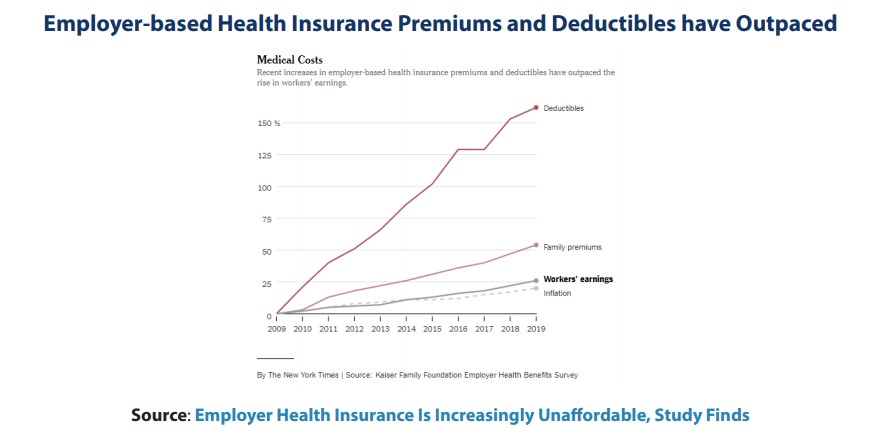
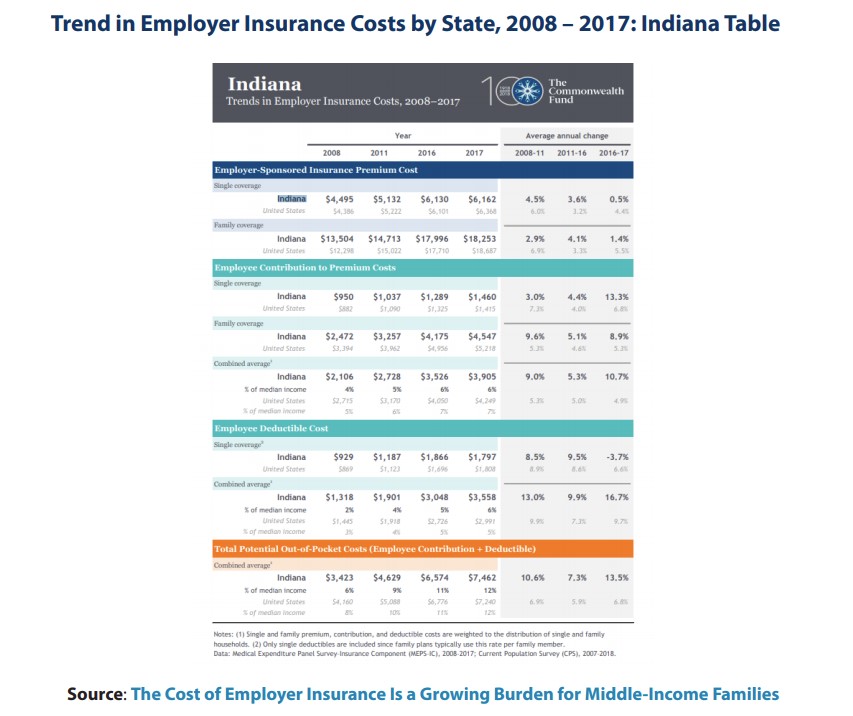
That Beloved Hospital? It’s Driving Up Health Care Costs (The New York Times)
Researchers at Yale and other universities came out with a study illustrating that from 2007 to 2014 hospital prices have increased 42% for inpatient care and 25% for outpatient care. Showing that hospitals are the biggest cost in the United States’ $3.5 trillion health care system. That is faster spending than wage growth, inflation, and gross domestic product.
Workers feel sting from shift to high-deductible health coverage
(Indianapolis Business Journal)
As workers and employers face the annual open-enrollment season this fall, many are seeing double-digit percentage increases in premiums, prompting even more to consider moving to high-deductible plans as a way to keep their costs under control.
2018 Medscape Physician Salary Survey (Medscape – Registration required)
Indiana physicians received the highest salary compensation in the US.
Employer Health Insurance Is Increasingly Unaffordable, Study Finds
(The New York Times)
A relentless rise in premiums and deductibles is putting insurance out of reach for many workers, especially those with low incomes.
The State Laws Impacting Healthcare Cost and Quality (SLIHCQ) Database
(Catalyst for Payment Reform)
Database that catalogues state legislation to contain healthcare costs and improve quality in a searchable and sortable, public database. The purpose of the database is to help purchasers, states, and policy makers understand their legal and regulatory environment as they make efforts to improve access, quality, and efficiency and reduce costs in health care.
Denver provider market at ‘tipping point,’ study finds (HealthLeaders)
The report expects employers and health plans to exert more influence in demanding market power going forward.
Walmart to pilot expanded healthcare benefits in 2020
(Talk Business & Politics)
Imagine if We Paid for Food like We Do Healthcare
(Foundation for Economic Education)
Do you have a suggestion for our next newsletter? Contact us.

